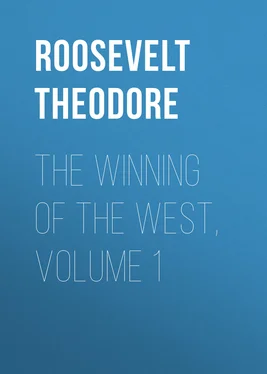Theodore Roosevelt - The Winning of the West, Volume 1
Здесь есть возможность читать онлайн «Theodore Roosevelt - The Winning of the West, Volume 1» — ознакомительный отрывок электронной книги совершенно бесплатно, а после прочтения отрывка купить полную версию. В некоторых случаях можно слушать аудио, скачать через торрент в формате fb2 и присутствует краткое содержание. Жанр: foreign_prose, История, foreign_edu, foreign_antique, на английском языке. Описание произведения, (предисловие) а так же отзывы посетителей доступны на портале библиотеки ЛибКат.
- Название:The Winning of the West, Volume 1
- Автор:
- Жанр:
- Год:неизвестен
- ISBN:нет данных
- Рейтинг книги:5 / 5. Голосов: 1
-
Избранное:Добавить в избранное
- Отзывы:
-
Ваша оценка:
- 100
- 1
- 2
- 3
- 4
- 5
The Winning of the West, Volume 1: краткое содержание, описание и аннотация
Предлагаем к чтению аннотацию, описание, краткое содержание или предисловие (зависит от того, что написал сам автор книги «The Winning of the West, Volume 1»). Если вы не нашли необходимую информацию о книге — напишите в комментариях, мы постараемся отыскать её.
The Winning of the West, Volume 1 — читать онлайн ознакомительный отрывок
Ниже представлен текст книги, разбитый по страницам. Система сохранения места последней прочитанной страницы, позволяет с удобством читать онлайн бесплатно книгу «The Winning of the West, Volume 1», без необходимости каждый раз заново искать на чём Вы остановились. Поставьте закладку, и сможете в любой момент перейти на страницу, на которой закончили чтение.
Интервал:
Закладка:
All these northwestern nations had at one time been conquered by the Iroquois, or at least they had been defeated, their lands overrun, and they themselves forced to acknowledge a vague over-lordship on the part of their foes. But the power of the Iroquois was now passing away: when our national history began, with the assembling of the first continental congress, they had ceased to be a menace to the western tribes, and the latter no longer feared or obeyed them, regarding them merely as allies or neutrals. Yet not only the Iroquois, but their kindred folk, notably the Wyandots, still claimed, and received, for the sake of their ancient superiority, marks of formal respect from the surrounding Algonquins. Thus, among the latter, the Leni-Lenappe possessed the titular headship, and were called "grandfathers" at all the solemn councils as well as in the ceremonious communications that passed among the tribes; yet in turn they had to use similar titles of respect in addressing not only their former oppressors, but also their Huron allies, who had suffered under the same galling yoke. 66 66 Barton, xxv.
The northwestern nations had gradually come to equal the Iroquois as warriors; but among themselves the palm was still held by the Wyandots, who, although no more formidable than the others as regards skill, hardihood, and endurance, nevertheless stood alone in being willing to suffer heavy punishment in order to win a victory. 67 67 General W. H. Harrison, "Aborigines of the Ohio Valley." Old "Tippecanoe" was the best possible authority for their courage.
The Wyandots had been under the influence of the French Jesuits, and were nominally Christians; 68 68 "Remarkable Occurrences in the Life and Travels of Col. James Smith," etc., written by himself, Lexington, Ky., 1799. Smith is our best contemporary authority on Indian warfare; he lived with them for several years, and fought them in many campaigns. Besides several editions of the above, he also published in 1812, at Paris, Ky., a "Treatise" on Indian warfare, which holds much the same matter.
and though the attempt to civilize them had not been very successful, and they remained in most respects precisely like the Indians around them, there had been at least one point gained, for they were not, as a rule, nearly so cruel to their prisoners. Thus they surpassed their neighbors in mercifulness as well as valor. All the Algonquin tribes stood, in this respect, much on the same plane. The Delawares, whose fate it had been to be ever buffeted about by both the whites and the reds, had long cowered under the Iroquois terror, but they had at last shaken it off, had reasserted the superiority which tradition says they once before held, and had become a formidable and warlike race. Indeed it is curious to study how the Delawares have changed in respect to their martial prowess since the days when the whites first came in contact with them. They were then not accounted a formidable people, and were not feared by any of their neighbors. By the time the Revolution broke out they had become better warriors, and during the twenty years' Indian warfare that ensued were as formidable as most of the other redskins. But when moved west of the Mississippi, instead of their spirit being broken, they became more warlike than ever, and throughout the present century they have been the most renowned fighters of all the Indian peoples, and, moreover, they have been celebrated for their roving, adventurous nature. Their numbers have steadily dwindled, owing to their incessant wars and to the dangerous nature of their long roamings. 69 69 See Parkman's "Oregon Trail." In 1884 I myself met two Delawares hunting alone, just north of the Black Hills. They were returning from a trip to the Rocky Mountains. I could not but admire their strong, manly forms, and the disdainful resolution with which they had hunted and travelled for so many hundred miles, in defiance of the white frontiersmen and of the wild native tribes as well. I think they were in more danger from the latter than the former, but they seemed perfectly confident of their ability to hold their own against both.
It is impossible to make any but the roughest guess at the numbers of these northwestern Indians. It seems probable that there were considerably over fifty thousand of them in all; but no definite assertion can be made even as to the different tribes. As with the southern Indians, old-time writers certainly greatly exaggerated their numbers, and their modern followers show a tendency to fall into the opposite fault, the truth being that any number of isolated observations to support either position can be culled from the works of the contemporary travellers and statisticians. 70 70 See Barton, the Madison MSS., Schoolcraft, Thos. Hutchins (who accompanied Bouquet), Smythe, Pike, various reports of the U. S. Indian Commissioners, etc, etc.
No two independent observers give the same figures. One main reason for this is doubtless the exceedingly loose way in which the word "tribe" was used. If a man speaks of the Miamis and the Delawares, for instance, before we can understand him we must know whether he includes therein the Weas and the Munceys, for he may or may not. By quoting the numbers attributed by the old writers to the various sub-tribes, and then comparing them with the numbers given later on by writers using the same names, but speaking of entire confederacies, it is easy to work out an apparent increase, while a reversal of the process shows an appalling decrease. Moreover, as the bands broke up, wandered apart, and then rejoined each other or not as events fell out, two successive observers might make widely different estimates. Many tribes that have disappeared were undoubtedly actually destroyed; many more have simply changed their names or have been absorbed by other tribes. Similarly, those that have apparently held their own have done so at the expense of their neighbors. This was made all the easier by the fact that the Algonquins were so closely related in customs and language; indeed, there was constant intermarriage between the different tribes. On the whole, however, there is no question that, in striking contrast to the southern or Appalachian Indians, these northwestern tribes have suffered a terrible diminution in numbers.
With many of them we did not come into direct contact for long years after our birth as a nation. Perhaps those tribes with all or part of whose warriors we were brought into collision at some time during or immediately succeeding the Revolutionary war may have amounted to thirty thousand souls. 71 71 I base this number on a careful examination of the tribes named above, discarding such of the northern bands of the Chippewas, for instance, as were unlikely at that time to have been drawn into war with us.
But though they acknowledged kinship with one another, and though they all alike hated the Americans, and though, moreover, all at times met in the great councils, to smoke the calumet of peace and brighten the chain of friendship 72 72 The expressions generally used by them in sending their war talks and peace talks to one another or the whites. Hundreds of copies of these "talks" are preserved at Washington.
among themselves, and to take up the tomahawk 73 73 Do .
against the white foes, yet the tie that bound them together was so loose, and they were so fickle and so split up by jarring interests and small jealousies, that never more than half of them went to war at the same time. Very frequently even the members of a tribe would fail to act together.
Thus it came about that during the forty years intervening between Braddock's defeat and Wayne's victory, though these northwestern tribes waged incessant, unending, relentless warfare against our borders, yet they never at any one time had more than three thousand warriors in the field, and frequently not half that number, 74 74 Smith, "Remarkable Occurrences," etc., p. 154. Smith gives a very impartial account of the Indian discipline and of their effectiveness, and is one of the few men who warred against them who did not greatly overestimate their numbers and losses. He was a successful Indian fighter himself. For the British regulars he had the true backwoods contempt, although having more than the average backwoods sense in acknowledging their effectiveness in the open. He had lived so long among the Indians, and estimated so highly their personal prowess, that his opinion must be accepted with caution where dealing with matters of discipline and command.
and in all the battles they fought with British and American troops there was not one in which they were eleven hundred strong. 75 75 The accounts of the Indian numbers in any battle given by British or Americans, soldiers or civilians, are ludicrously exaggerated as a rule; even now it seems a common belief of historians that the whites were generally outnumbered in battles, while in reality they were generally much more numerous than their foes.
Интервал:
Закладка:
Похожие книги на «The Winning of the West, Volume 1»
Представляем Вашему вниманию похожие книги на «The Winning of the West, Volume 1» списком для выбора. Мы отобрали схожую по названию и смыслу литературу в надежде предоставить читателям больше вариантов отыскать новые, интересные, ещё непрочитанные произведения.
Обсуждение, отзывы о книге «The Winning of the West, Volume 1» и просто собственные мнения читателей. Оставьте ваши комментарии, напишите, что Вы думаете о произведении, его смысле или главных героях. Укажите что конкретно понравилось, а что нет, и почему Вы так считаете.












